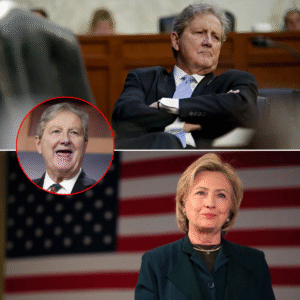
A dramatic and controversial speech attributed to Senator John Neely Kennedy went viral this week after social media posts claimed he had demanded that former Secretary of State Hillary Clinton face charges of “treason without expiration” for the 2012 Benghazi attack. The posts, which spread across X, Facebook, TikTok, and fringe political sites, alleged that Kennedy delivered a fiery Senate-floor indictment tying Clinton to covert arms deals, terrorist groups, and the death of four Americans.
But no such Senate speech occurred, and the allegations contained in the viral narrative echo long-debunked conspiracy theories rather than findings from any official investigation.
The Viral Claim That Reignited an Old Controversy
According to the circulating posts, Kennedy supposedly declared on the Senate floor:
“Hillary Clinton should not have immunity for this. There should be no statute of limitations for treason against the United States.”
The viral narrative then alleged a series of explosive claims: arms trafficking routed through Ambassador Chris Stevens, Stinger missiles reaching terrorist groups, a foiled Taliban attack using an allegedly traceable missile, and a massive cover-up involving “stand-down orders” and email deletions.
This storyline reads like a political thriller — but none of these claims are supported by credible evidence, declassified documents, or the findings of the numerous bipartisan investigations that examined Benghazi between 2012 and 2016.
What Actually Happened in Benghazi?
On September 11, 2012, militants attacked U.S. facilities in Benghazi, Libya, killing Ambassador Chris Stevens, Information Officer Sean Smith, and former Navy SEALs Tyrone Woods and Glen Doherty. The tragedy prompted:
-
10 congressional committees
-
33 public hearings
-
~100 witness interviews
-
Thousands of pages of classified and unclassified documentation
Across these investigations — including Republican-led probes — no evidence emerged showing Clinton intentionally armed terrorist groups, facilitated illegal weapons transfers, or issued “stand-down orders.”
The House Select Committee on Benghazi concluded in 2016 that while there were security failures and bureaucratic gaps, no wrongdoing by Clinton rose to criminal conduct.
The Arms-Trafficking Conspiracy: What Experts Say
The viral posts resurrect a claim involving arms dealer Marc Turi and alleged CIA-backed weapons transfers to Libyan rebels. In reality:
-
The Justice Department dropped unrelated charges against Turi in 2016 with no finding of misconduct by Clinton or the State Department.
-
No official investigation has ever linked U.S.-supplied Stinger missiles to the Benghazi attackers.
-
Pentagon records show no verified incident in Afghanistan where a Stinger traced to Libya was recovered after a failed detonation.
National security specialists describe the allegations as “recycled internet myths,” often emerging during election cycles.
Did Kennedy Actually Give This Speech?
No.
A review of:
-
Senate floor transcripts
-
C-SPAN archives
-
Congressional calendars
-
Kennedy’s official press releases
-
Statements from his communications office
shows no record of Kennedy delivering any such remarks.
The speech exists only in the viral posts spreading online — not in congressional records.
Why These Claims Resurface Again and Again
Political analysts point to several reasons:
1. Benghazi remains an emotionally charged event
The death of a U.S. ambassador is rare and deeply symbolic. It continues to evoke strong reactions across the political spectrum.
2. Clinton is a high-profile, polarizing figure
Her long political career makes her a frequent target of misinformation campaigns.
3. The internet rewards dramatic narratives
Claims involving cover-ups, treason, assassinations, or hidden documents attract millions of views — even if disproven.
4. AI tools are making misinformation more convincing
Fabricated speeches, synthetic transcripts, and AI-edited “declassified documents” increasingly blur the line between fiction and reality.
The Danger of Viral Misinformation
Security experts warn that recycled conspiracy theories can:
-
Mislead voters
-
Deepen political polarization
-
Distract from real foreign-policy lessons
-
Erode trust in factual reporting
-
Harm the reputations of public servants without evidence
When complex geopolitical events are rewritten as entertainment-style scandals, meaningful policy discussion becomes harder.
Conclusion: Separating Fact From Fiction
The viral claim of a Kennedy “Benghazi betrayal” speech is not a real event. The accusations it contains are not supported by evidence, not confirmed by investigators, and not backed by congressional records.
Benghazi remains a serious historical tragedy — one thoroughly investigated across multiple U.S. administrations. But the resurfacing of debunked narratives illustrates how easily misinformation can dominate online conversation.
As election seasons intensify and AI-generated content grows more sophisticated, verifying before sharing remains critical.





